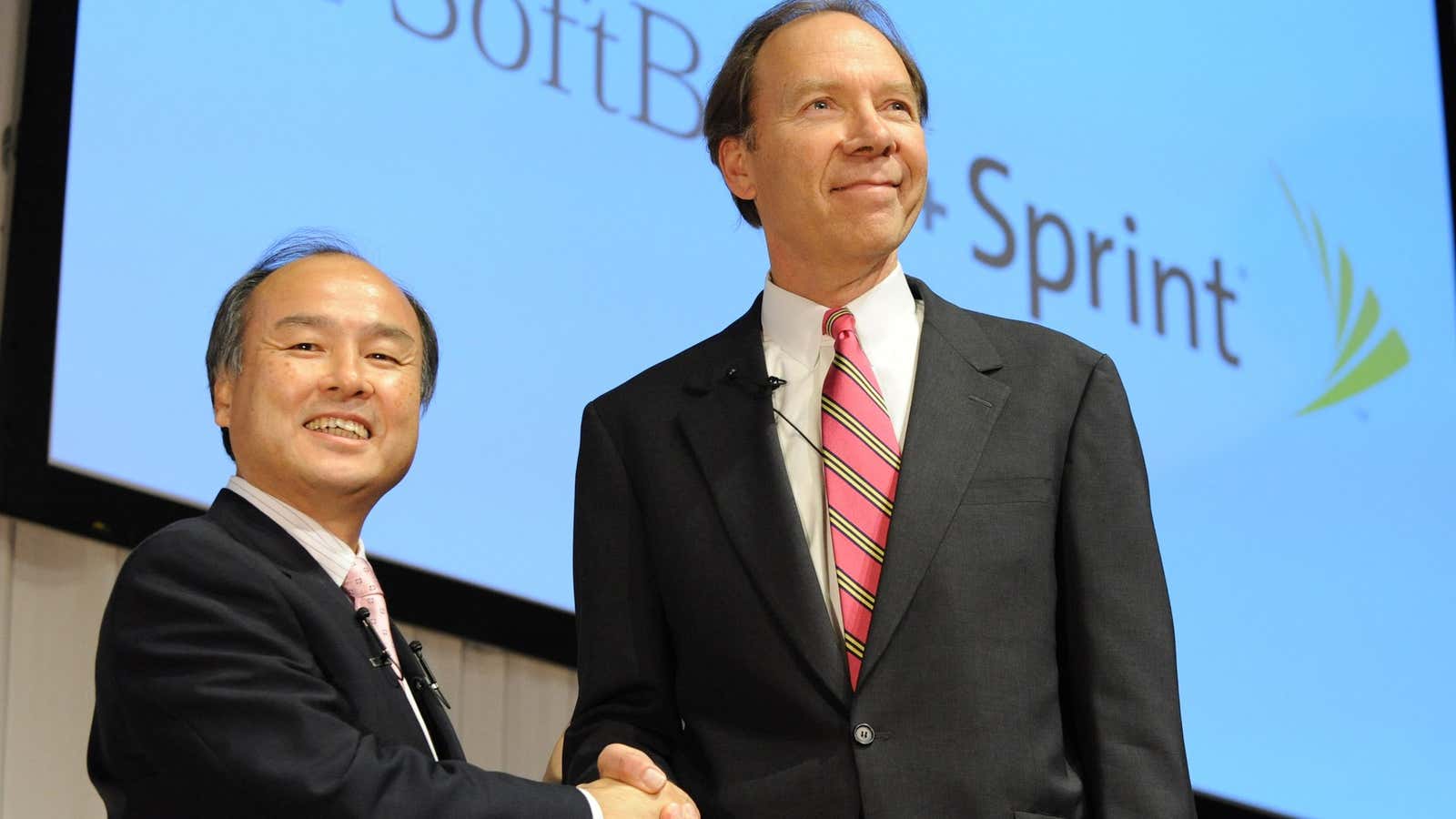This morning’s announcement by satellite TV provider Dish Network—an also-ran to more-successful competitor DirecTV—that it wants to buy America’s 3rd-largest mobile carrier, Sprint Nextel, for $25.5 billion, should come as no surprise. Dish Chairman Charlie Ergen has been courting seemingly every second- and third-tier US mobile carrier, including MetroPCS, T-mobile and Clearwire.
With Sprint, Dish faces a fight against Japan’s Softbank, which is also competing to acquire Sprint. Softbank is a much larger company and a wireless one, to boot. Softbank could bring its own innovations, leverage over handset makers in the form of ownership of spectrum in Japan, and history of successfully competing against larger telecom companies to the US. With that in mind, it’s hard to see Sprint’s board going for Dish.
If the rapid pace of Dish’s courtships smacks of desperation, it should—Dish is racing against a deadline imposed by the US Federal Communications Commission. When Dish recently convinced the FCC to let it convert wireless spectrum it owned, which had previously been set aside for satellite telephony, into spectrum to be used for cell phone service, the FCC gave Dish a deadline. Within 7 years, Dish would have to build or buy a cell network that would cover 70% of the geographic area in which it owned the spectrum.
Building its own cell network on that scale, in that time period, is a nearly impossible—or at least impossibly expensive—task for a company the size of Dish. (Dish only booked $14.3 billion in revenue last year, compared to Sprint’s $35.3 billion—and Sprint already has a nation-spanning network.)
But wait, it gets worse. Even if Dish could acquire Sprint or some other carrier tomorrow, it would have to retrofit most of that carrier’s cell phone towers to broadcast and transmit in a new spectrum range—known as S-band—a portion of which was once was used for satellite phones. That’s not to mention other spectrum Dish owns, which has been approved for use as the AWS-4 standard—another Dish-only exclusive.
The final barrier to Dish succeeding in its race to meet the FCC’s deadline is that even once it owns a cell carrier, and has retrofitted its towers, the only way it can pay back all the debt that it will have on its books—between Sprint, Dish and the acquisition costs, that would be in excess of $45 billion—is to convince cell phone manufacturers to roll out phones that take advantage of Dish’s spectrum. In the long run, more spectrum could mean faster cell service, and that’s certainly the logic behind Sprint’s attempted acquisition of Clearwire (Dish was trying to thwart that attempt and had also made a bid for Clearwire). But does Dish have that much time? Its existing pay-TV business is stagnant, and a combined Dish/Sprint would have to be valued by investors on the merits of both businesses at the same time.
After all of its courtships, Dish really needs to win a date. When T-Mobile was looking at selling assets to win over regulators in its sale to AT&T in 2011, Dish looked at picking up some of the pieces, according to sources. When it looked like AT&T could fail in its bid for T-Mobile because of antitrust hurdles, Dish also looked to partner with T-Mobile in a more substantive way. AT&T ended up dropping its bid and now T-Mobile is in a proposed merger with Metro PCS. Sources said Dish also looked at Metro PCS around the same time that the carrier was in talks with Sprint in 2012.
The musical chairs reflects the scramble for precious spectrum, but also shows how hard it’s been to get a deal done in this sector. Since the T-Mobile deal was blocked, AT&T has been cautious about going after any big targets out of fear of being held back by regulators again, according to sources. Shareholder opposition has also been a factor. Last week, T-Mobile’s parent company, Deutsche Telekom, sweetened its offer for Metro PCS to win over shareholders. Now it looks like that merger will go through.
